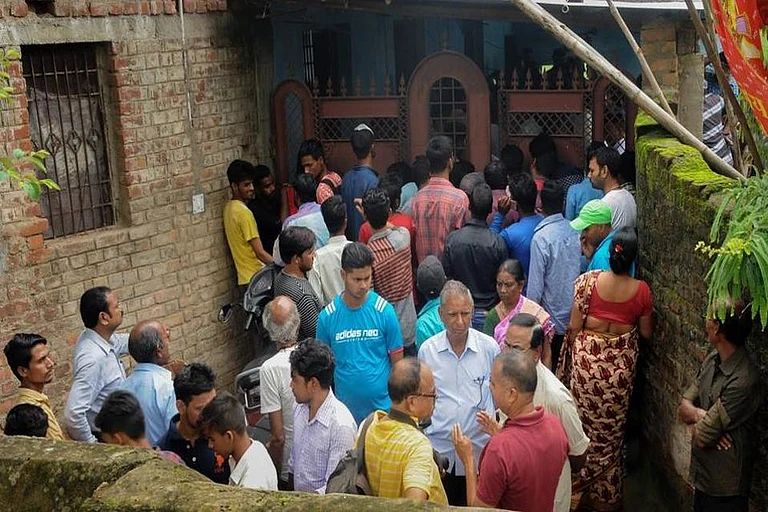As the Jharkhand Chief Minister Hemant Soren Government is about to pass the contentious domicile policy that will demarcate the local inhabitants on the basis of 1932 land survey, there have been enormous enthusiasm among the Adivasis and Moolvasis of the state. With passing of the bill, not only Soren will fulfil his 2019 election commitments, rather, it will be historic as no other government since the formation of Jharkhand state ever could implement it. The first CM of Jharkhand Babulal Marandi though tried to to push it, the domicile policy couldn't survive the judicial scrutiny.
The move toward a new domicile policy - which will secure those registered as "Jharkhandis" to get distinct advantages in the jobs and education sectors among other benefits - has led to questions about another contentious domicile policy that was recently implemented in the north-eastern state of Assam - the National Register of Citizens in Assam.
Does the new domicile policy in Jharkhand have any similarities with NRC? Would the new move in Jharkhand have any bearing in Assam where NRC is being implemented?
NRC in Assam
The National Register of Citizens (NRC) is a register of all Indian citizens whose creation is mandated by the 2003 amendment of the Citizenship Act, 1955. The NRC was first implemented in Assam with the aim to identify the state's bonafide residents and to deport illegal migrants who are believed to have settled in the state, especially from Bangladesh. The proposed reason for implementing the exercise was to maintain the unique ethnic composition of the state. However, the implementation of NRC immediately led to calls for its implementation in other Indian states as well as for a pan-India NRC exercise.
The demands, which were supported by several BJP leaders, led to protests across the country which turned violent. There were fears that the NRC would be used in collusion with the Citizenship Amendment Act, 2019, passed in the same year, which sought make illegal immigrants who were Hindus, Sikhs, Buddhists, Jains, Parsis and Christians from Afghanistan, Bangladesh and Pakistan, and entered India on or before 31 December 2014, legal citizens. The Act did not mention Muslims.
Critics claimed that the NRC, which aims to deport illegal immigrants, along with the CAA, would unfairly target Muslims.
Under NRC, any person who has entered Assam after 1971 will be deported as an illegal immigrant. To prove themselves as citizens of Assam, residents need to have their names on the NRC 1951 list, or in any of the Electoral Rolls up to March 24, 1971. Descendants of such persons will be allowed granted citizenship as well. The NRC also granted citizens to "original" inhabitants of Assam as well as those who entered between 1966 and 1971. The complex rules and the documents needed to establish oneself as an Assamese citizen led to many protests and slogans like "Kagaz Nahin Dikhaenge".
What's happening in Jharkhand now
Under the new domicile policy of Jharkhand, 1932 land records will be accepted as proof to demarcate the local inhabitants of the state. The residents whose ancestral lands had been registered in the Land Survey of 1932 will be considered ‘Jharkhandi’. However, both the landless persons and the families whose names are not included in ‘Khata’ may approach the Gram Sabha for their inclusion.
The decision came in the backdrop of continuous political turmoil in Jharkhand and allegations of BJP putting effort to topple Soren government. Ironically, it was only six months back that Soren said that the 1932 Khatiyan would not be the only marker of the domicile policy as it would fail the judicial scrutiny.
But is the 1932 Khatiyan movement similar to NRC?
Prem Sahi from the Munda Adivasi Jan Parishad tells Outlook that the domicile policy in Jharkhand is nothing like NRC. “The NRC exercise is a region-specific issue in Assam. What is happening in Jharkhand is the culmination of a different movement,” Sahi tells Outlook. He adds, “In Assam, the tribal people already had rights and reservations. Their issue is mainly against illegal immigrants and ethnic concerns. Here, the question is mainly about outsiders getting jobs while tribals who are the original inhabitants of Jharkhand aren’t”.
While Sahi expresses strong objections to linking the Khatiyan with NRC, there are some similarities. Much like the NRC, the new policy also hinges on the question of identity and statehood on documents that date back many decades. Adivasi rights Activist and Jan Adhikar Manch member Ramesh Jerai says that on paper, both the NRC and the Khatiyan movement have the "insider-outsider" debate at its centre.
"Yes, both NRC and the Khatiyan policy (if implemented) will have a similar framework for deciding who is the original Assamese or Jharkhandi. In both cases, tribal populations are at the centre of the debate. But the perspective and the underlying reasons for NRC and the Khatiyan movement are not the same," Jerai tells Outlook.
Insider vs Outsider debate
In Assam, an influx of illegal immigrants from Bangladesh changing the demographic structure of the ethnically diverse and unique state was at the crux of the call for NRC. Jerai, however, points out that in Jharkhand, the movement for asserting the "Jharkhandi" identity was rooted in a fight against oppression and exploitation from "outsiders".
It is true that the politics of identity has played a huge part in the movement for Jharkhand's statehood. Former Andolankari Zubair Ahmed who now runs an egg stall tells Outlook that back in the heydays of the movement, the AJTU, Jharkhand's student union, which played an intrinsic role in the statehood movement, was deeply influenced by All Assam Students' Union (AASU), the students' organisation in Assam known for leading the six-year Assam Movement against illegal immigrants from Bangladesh. The body was intrinsic in the signing of the historic Assam Accord of 1985 under which, a person who came to Assam from East Pakistan after 1951 and before 1971 was given citizenship.
Incidentally, Muslims in the state have expressed their approval of the new move. Outlook reported on how Muslims in the state are at the forefront of all the pro-domicile processions. Not only that, while speaking to Outlook, one of them, said, "Kagaz Zaroor Dikhaenge" while others expressed confidence in the government’s move.
Politics at work
The move by the Jharkhand government comes at a time of turmoil fo the Soren government which recently won a trust vote initiated by the CM himself to prove his majority on the floor. Many like Ramesh Jerai feel that the move is politically motivated. "The CM is just buying team. He knows the rule will never be notified as Centre will not accept it," Jerai adds.
Incidentally, the Soren government has found support from the pro-BJP AJSU. On Friday, AJSU Central Secretary Madhav Chandra Mahato welcomed the cabinet approval for the policy change, which grants rights of locality and 27 percent reservation on the basis of the 1932 Khatian documents.
The Adivasi Moolvasi Janadhikar Manch's Raju Mahto had said in 2016 that only those who or whose forefathers had land papers in the 1932 Khatiya should be dubbed as "locals" and given reservation in jobs. Following the Soren government's move, which comes days after a trust vote which Soren won in the state Assembly, the celebration was mixed with caution. The Jharkhand Janadhikar Mahasabha, for instance, has put out a statement in which it reviewed the government's policy amendment and suggested changes, especially for landless farmers.
However, the new land policy will only come into effect once it clears both houses of Parliament and passes judicial scrutiny. Till then, it remains to be seen how far the Sonren government is planning to stick it out with the Khatiyan Andolan and andolankaris.


























